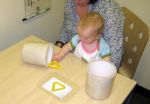(Press-News.org) Asking NHS staff about what affects whether they would recommend their organisation for family and friends is an important source of intelligence for improving quality and safety of care, says a new study.
This finding by researchers in the Universities of Leicester, Aberdeen, and Bristol has been published in a paper, 'The friends and family test: a qualitative study of concerns that influence the willingness of English National Health Service staff to recommend their organisation', in the Journal of the Royal Society of Medicine.
Since 2009, the annual Staff Survey across the NHS in England has asked staff to say whether they agreed with the statement that: 'If a friend or relative needed treatment I would be happy with the standard of care provided by the organisation'. On average, around two thirds of staff agreed with this statement in 2013, but the lowest score was 39.5% and the highest was 94%. Despite this variability, it was not known why staff appear to be more willing to recommend some organisations more than others.
Professor Mary Dixon-Woods, Professor of Medical Sociology at the University of Leicester, says: "The hard data that shows that, overall, NHS staff are supportive of the care provided by their organisations. But that's not consistently the case always and everywhere. What was missing was 'softer' intelligence to help us to know what lies behind the scores and what to do in response.
"We aimed to identify what explains staff's willingness to recommend their organisation. We undertook 168 interviews with people across the NHS that included the question: 'If a friend or relative were treated in your organisation, what would concern you most?'"
Staff offered detailed and candid responses to this question, with some saying they had no concerns and others having multiple concerns. Most said that they could identify good features of their organisation but it was reliability that concerned them most.
Many of the issues were revealed to be deeply structural, and related to problems such as poorly designed and badly functioning systems; under-staffing, including lack of availability of the right skills; and under-resourcing due to competing priorities.
There were concerns about clinical care, including incorrect diagnoses, inappropriate therapies and poorly administered interventions; lack of management skills; and some unprofessional conduct. Interviewees felt that many problems with caring arose when staff were harassed and over-stretched by too many competing demands and priorities, or when they lacked effective leadership.
Professor Dixon-Woods says: "Sir Robert Francis, in his recommendations about how to address quality of care in the NHS, said that feedback from staff should not only be encouraged but insisted upon. This study shows that asking staff directly about what concerns them can yield much valuable intelligence about where improvements can be made. The next stage will be to see if this can be reproduced outside a research context. That means providing opportunities for staff to speak up not just about incidents and major concerns, but about the little things that get in the way of providing good care too. And it means ensuring that it is safe for staff to raise those concerns and that action is taken in response."
INFORMATION: END
Candid 'insider' views in the NHS could help detect reasons for poor care
Research published in the Journal of the Royal Society of Medicine emphasizes importance of listening to staff
2014-04-30
ELSE PRESS RELEASES FROM THIS DATE:
Greater surgeon experience increases likelihood of mitral valve repair vs. replacement
2014-04-30
Toronto, ON, Canada, April 30, 2014 – A new study presenting data from 17 cardiac surgical centers in Virginia, representing 100 surgeons and 99% of cardiac operations performed in the state, demonstrates that, even today, significant variations – among surgeons and hospitals - still exist in the performance of mitral valve repair vs replacement for moderate to severe mitral regurgitation. Significant associations were observed between the propensity for MV repair and both institutional and surgeon annual volume, although increasing surgeon volume appears to be the much ...
CT in the operating room allows more precise removal of small lung cancers
2014-04-30
Toronto, ON, Canada, April 30, 2014 – A new technique that brings CT imaging into the operating room will allow surgeons to precisely demarcate and remove small sub-centimeter lung nodules, leaving as much healthy tissue as possible, according to Raphael Bueno, MD, of Brigham and Women's Hospital in Boston. His team is presenting the results of this late-breaking research at the 94th AATS Annual Meeting in Toronto, ON, Canada on April 30, 2014.
Lung cancer remains the deadliest cancer and a recent study, the National Lung Cancer Screening Trial, indicated that screening ...
New lab-on-a-chip device overcomes miniaturization problems
2014-04-30
UNSW Australia chemists have invented a new type of tiny lab-on-a-chip device that could have a diverse range of applications, including to detect toxic gases, fabricate integrated circuits and screen biological molecules.
The novel technique developed by the UNSW team involves printing a pattern of miniscule droplets of a special solvent onto a gold-coated or glass surface.
"We use a class of 'green' solvents called ionic liquids, which are salts that are liquid at room temperature. They are non-volatile, so this overcomes one of the main problems in making useful miniaturised ...
MRI shows disrupted connections in the brains of young people with ADHD
2014-04-30
OAK BROOK, Ill. – A new study has found that children and adolescents with attention deficit hyperactivity disorder (ADHD) have disrupted connections between different areas of the brain that are evident on resting-state functional magnetic resonance imaging (rfMRI). The results of this research are published online in the journal Radiology.
The findings point to the potential of rfMRI to help provide objectively accurate, early diagnosis of a disorder that affects approximately 5 percent of children and adolescents worldwide.
ADHD is a disorder characterized by age-inappropriate ...
Want a young child to 'help' or 'be a helper'? Choice of words matters
2014-04-30
How do you get a preschooler to help with chores and other household tasks? A new study suggests that adults' word choice can make a big difference.
The study, by researchers at the University of California, San Diego, the University of Washington, and Stanford University, appears in the journal Child Development.
The researchers carried out two experiments with about one hundred and fifty 3- to 6-year-olds from a variety of ethnic and racial backgrounds who came from middle- to upper-middle-class homes. In both experiments, an adult experimenter began by talking to ...
Working memory differs by parents' education; effects persist into adolescence
2014-04-30
Working memory—the ability to hold information in your mind, think about it, and use it to guide behavior—develops through childhood and adolescence, and is key for successful performance at school and work. Previous research with young children has documented socioeconomic disparities in performance on tasks of working memory. Now a new longitudinal study has found that differences in working memory that exist at age 10 persist through the end of adolescence. The study also found that parents' education—one common measure of socioeconomic status—is related to children's ...
Magnitude of quake scales with maturity of fault, suggests new study by German scientist
2014-04-30
SAN FRANCISCO -- The oldest sections of transform faults, such as the North Anatolian Fault Zone (NAFZ) and the San Andreas Fault, produce the largest earthquakes, putting important limits on the potential seismic hazard for less mature parts of fault zones, according to a new study to be presented today at the Seismological Society of America (SSA) 2014 Annual Meeting in Anchorage, Alaska. The finding suggests that maximum earthquake magnitude scales with the maturity of the fault.
Identifying the likely maximum magnitude for the NAFZ is critical for seismic hazard ...
Out of sight but not out of mind: Babies transfer learning from pictures to real objects by 9 months
2014-04-30
Babies begin to learn about the connection between pictures and real-life objects early on. A new study has found that by 9 months, babies can learn about an object from a picture of it and can transfer that learning to the real object when they come across it.
The study, by researchers at Royal Holloway, University of London and the University of South Carolina, appears in Child Development, the journal of the Society for Research in Child Development.
"The study should interest any parent or caregiver who has ever read a picture book with an infant," says Jeanne L. ...
Babies recognize real-life objects from pictures as early as 9 months
2014-04-30
Babies begin to learn about the connection between pictures and real objects by the time they are nine-months-old, according to a new study by scientists at Royal Holloway, University of London, and the University of South Carolina.
The research, published today in Child Development, found that babies can learn about a toy from a photograph of it well before their first birthday.
"The study should interest any parent or caregiver who has ever read a picture book with an infant," said Dr Jeanne Shinskey, from the Department of Psychology at Royal Holloway. "For parents ...
New health system scorecard shows little progress among states from 2007-2012
2014-04-30
New York, NY, April 30, 2014—States made little progress in improving health care access, quality, and outcomes and lowering costs in the five years preceding implementation of the major coverage provisions of the Affordable Care Act (2007-2012), according to the Commonwealth Fund's third state health system scorecard. The majority of states declined or failed to improve on two-thirds of the 34 scorecard indicators that could be tracked over time.
Wide gaps among states persisted since the last scorecard, with top states sometimes performing two to eight times better ...
LAST 30 PRESS RELEASES:
Billion-DKK grant for research in green transformation of the built environment
For solar power to truly provide affordable energy access, we need to deploy it better
Middle-aged men are most vulnerable to faster aging due to ‘forever chemicals’
Starving cancer: Nutrient deprivation effects on synovial sarcoma
Speaking from the heart: Study identifies key concerns of parenting with an early-onset cardiovascular condition
From the Late Bronze Age to today - Old Irish Goat carries 3,000 years of Irish history
Emerging class of antibiotics to tackle global tuberculosis crisis
Researchers create distortion-resistant energy materials to improve lithium-ion batteries
Scientists create the most detailed molecular map to date of the developing Down syndrome brain
Nutrient uptake gets to the root of roots
Aspirin not a quick fix for preventing bowel cancer
HPV vaccination provides “sustained protection” against cervical cancer
Many post-authorization studies fail to comply with public disclosure rules
GLP-1 drugs combined with healthy lifestyle habits linked with reduced cardiovascular risk among diabetes patients
Solved: New analysis of Apollo Moon samples finally settles debate about lunar magnetic field
University of Birmingham to host national computing center
Play nicely: Children who are not friends connect better through play when given a goal
Surviving the extreme temperatures of the climate crisis calls for a revolution in home and building design
The wild can be ‘death trap’ for rescued animals
New research: Nighttime road traffic noise stresses the heart and blood vessels
Meningococcal B vaccination does not reduce gonorrhoea, trial results show
AAO-HNSF awarded grant to advance age-friendly care in otolaryngology through national initiative
Eight years running: Newsweek names Mayo Clinic ‘World’s Best Hospital’
Coffee waste turned into clean air solution: researchers develop sustainable catalyst to remove toxic hydrogen sulfide
Scientists uncover how engineered biochar and microbes work together to boost plant-based cleanup of cadmium-polluted soils
Engineered biochar could unlock more effective and scalable solutions for soil and water pollution
Differing immune responses in infants may explain increased severity of RSV over SARS-CoV-2
The invisible hand of climate change: How extreme heat dictates who is born
Surprising culprit leads to chronic rejection of transplanted lungs, hearts
Study explains how ketogenic diets prevent seizures
[Press-News.org] Candid 'insider' views in the NHS could help detect reasons for poor careResearch published in the Journal of the Royal Society of Medicine emphasizes importance of listening to staff

